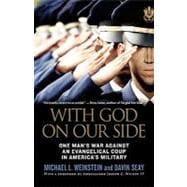
| Foreword | p. ix |
| Acknowledgments | p. xiii |
| A Family Tradition | p. 1 |
| The Cadet Chapel | p. 6 |
| A History of Honor, and of Scandal | p. 13 |
| "They Want You to Be in Heaven with Them" | p. 28 |
| "Sword of the Lord" | p. 40 |
| The Passion of the Evangelicals | p. 50 |
| The Yale Practicum: An External Review | p. 64 |
| Panic in the Air | p. 73 |
| Circling the Wagons | p. 81 |
| Going National | p. 90 |
| A Chaplain Dismissed | p. 100 |
| The Brady Report | p. 111 |
| "We Reserve the Right to Evangelize the Unchurched" | p. 122 |
| Awkward, Uneasy, Alienated | p. 130 |
| Struggle for a Daughter's Soul | p. 142 |
| The Silence of the Brass | p. 153 |
| Weinstein Files Suit | p. 163 |
| Singled Out | p. 176 |
| In a Zone Beyond Fear | p. 184 |
| A Dark Secret Brought to Light | p. 193 |
| Looking Back and Looking Forward | p. 200 |
| The "Yale Practicum" Report | p. 211 |
| Report of Americans United for Separation of Church and State on Religious Coercion and Endorsement of Religion at the United States Air Force Academy | p. 215 |
| Executive Summary of the Report of the Headquarters Review Group Concerning the Religious Climate at the U.S. Air Force Academy, 22 June 2005 | p. 233 |
| In the United States District Court for the District of New Mexico | p. 239 |
| The Covenant and the Code of Ethics for Chaplains of the Armed Forces, from the Basic Chaplains Course (BCC-02C), 20 May-14 June 2002 | p. 243 |
| Index | p. 247 |
| Table of Contents provided by Ingram. All Rights Reserved. |
The New copy of this book will include any supplemental materials advertised. Please check the title of the book to determine if it should include any access cards, study guides, lab manuals, CDs, etc.
The Used, Rental and eBook copies of this book are not guaranteed to include any supplemental materials. Typically, only the book itself is included. This is true even if the title states it includes any access cards, study guides, lab manuals, CDs, etc.
Excerpted from With God on Our Side: One Man's War Against an Evangelical Coup in America's Military by Michael L. Weinstein, Davin Seay
All rights reserved by the original copyright owners. Excerpts are provided for display purposes only and may not be reproduced, reprinted or distributed without the written permission of the publisher.